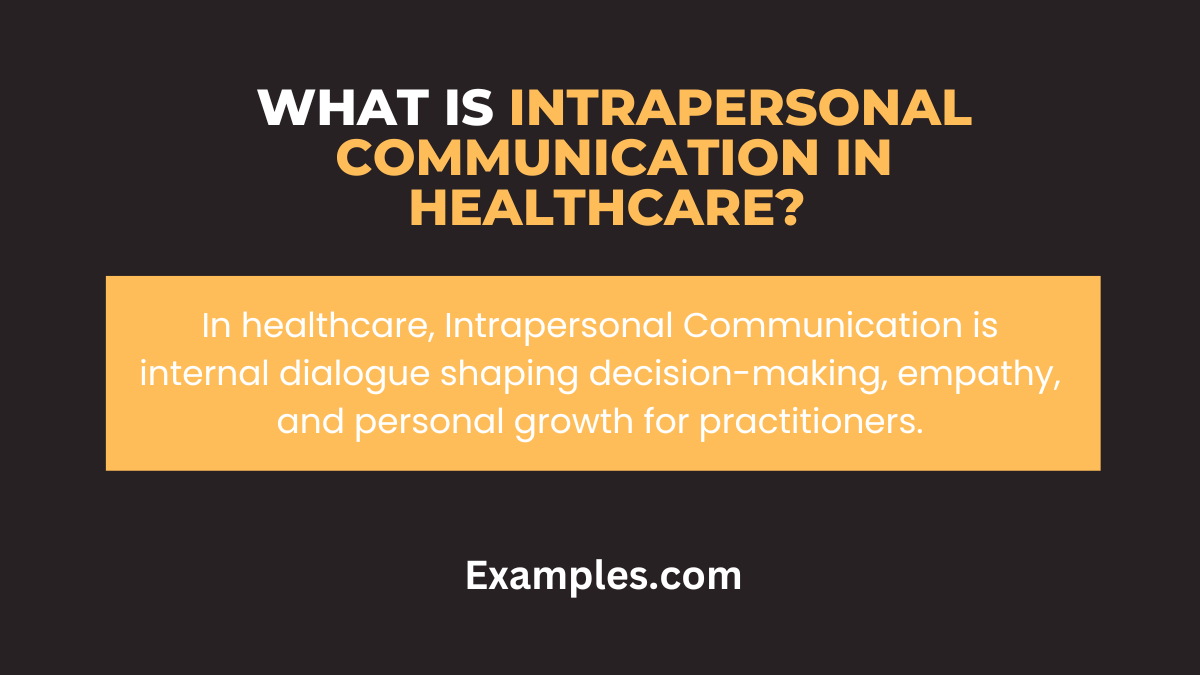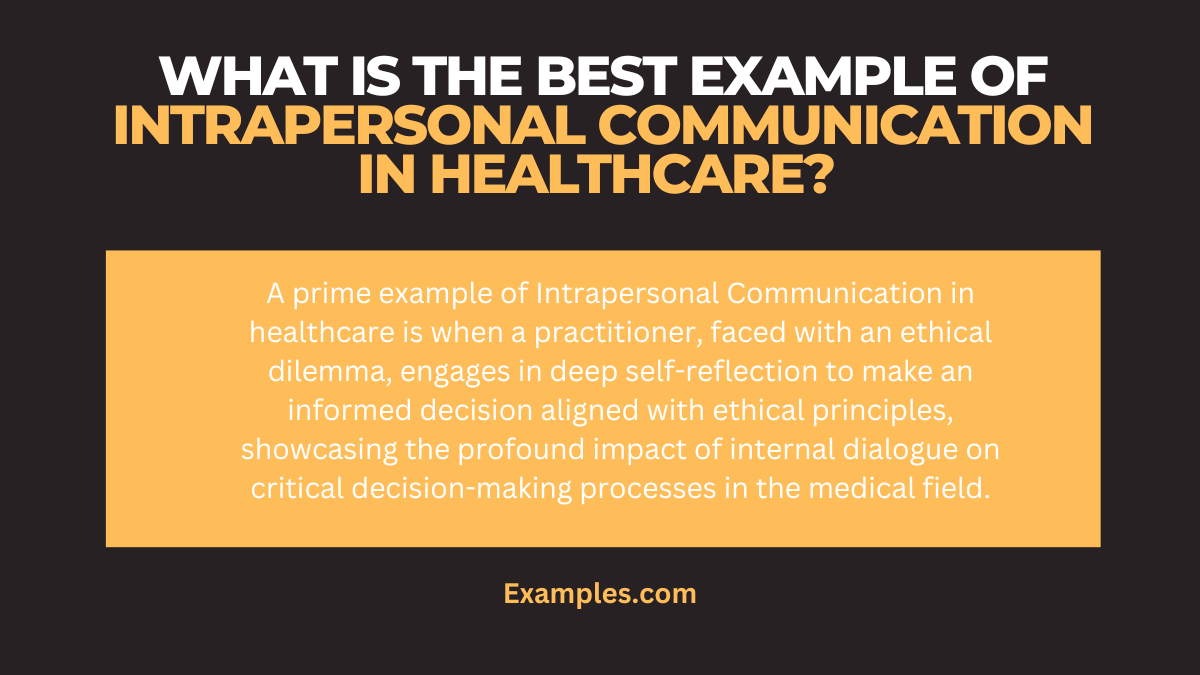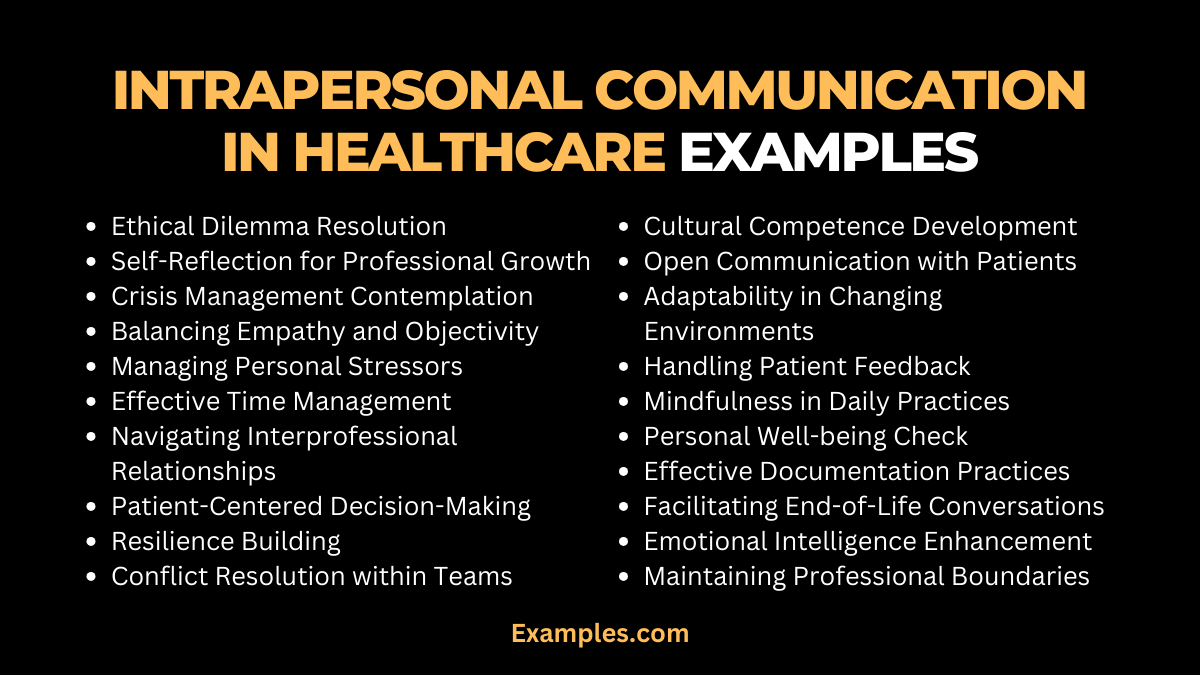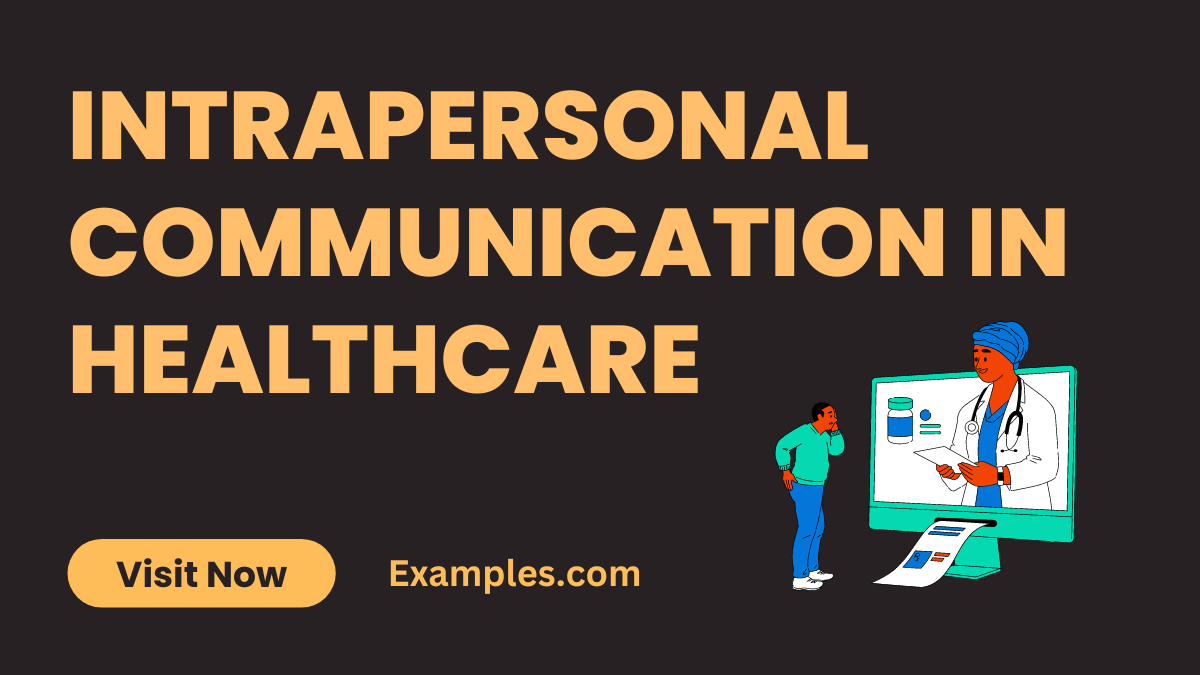19+ Intrapersonal Communication in Healthcare Examples
Embark on a transformative journey through the intricate realm of Intrapersonal Communication in Healthcare with our comprehensive guide. Uncover the nuances of effective self-dialogue within the medical context. This detailed exploration is designed to enrich your understanding of communication examples, providing practical insights for healthcare professionals. Elevate your interpersonal skills, navigate challenging scenarios, and gain a deeper appreciation for the vital role Intrapersonal Communication plays in the healthcare landscape. Explore, learn, and enhance your abilities for optimal patient care and professional growth.
What is Intrapersonal Communication in Healthcare?

In simple terms, Intrapersonal Communication in Healthcare refers to the internal dialogue and self-reflection that healthcare professionals engage in within themselves. It involves the ability to understand, process, and manage one’s thoughts and emotions, contributing to effective decision-making and interpersonal interactions. This internal communication plays a pivotal role in the healthcare context, influencing the quality of patient care and fostering personal and professional growth within the medical field.
What is the Best Example of Intrapersonal Communication in Healthcare?

Consider a scenario where a healthcare provider is faced with a challenging medical decision. Through Intrapersonal Communication, they engage in deep self-reflection, weighing ethical considerations, personal values, and professional obligations. This internal dialogue enables the healthcare professional to arrive at a well-informed and morally sound decision, aligning with the best interests of the patient. Such instances showcase the profound impact of Intrapersonal Communication in Healthcare, shaping critical decision-making processes and ensuring optimal patient-centered care.
20 Intrapersonal Communication in Healthcare Examples

Delve into a rich array of Intrapersonal Communication instances within the healthcare domain, each offering valuable insights into effective self-dialogue for professionals. From ethical decision-making to personal growth, these examples illuminate the significance of internal communication.
- Ethical Dilemma Resolution: When faced with a moral quandary, healthcare professionals navigate internal reflections to align decisions with ethical principles.
- Self-Reflection for Professional Growth: Through introspection, practitioners identify areas for improvement, fostering continuous development.
- Crisis Management Contemplation: In critical situations, internal dialogue guides healthcare workers in maintaining composure and making sound decisions.
- Balancing Empathy and Objectivity: Achieving the delicate balance between empathy and objectivity in patient interactions through mindful self-talk.
- Managing Personal Stressors: Internal communication aids in coping with the emotional toll of healthcare work, ensuring sustained well-being.
- Effective Time Management: Healthcare providers utilize self-dialogue to prioritize tasks and optimize time for enhanced productivity.
- Navigating Interprofessional Relationships: Internal reflections contribute to fostering positive collaborations and effective communication among healthcare teams.
- Patient-Centered Decision-Making: Tailoring medical decisions by considering patients’ individual needs and preferences through thoughtful self-contemplation.
- Resilience Building: Intrapersonal Communication assists healthcare professionals in developing resilience to cope with challenging situations.
- Conflict Resolution within Teams: Professionals use internal dialogue to address conflicts, fostering a harmonious work environment.
- Cultural Competence Development: Understanding and embracing diverse perspectives through self-reflection enhances cultural competence in healthcare.
- Open Communication with Patients: Through internal conversations, practitioners refine communication styles to establish transparent and trustful relationships with patients.
- Adaptability in Changing Environments: Healthcare workers navigate uncertainty by engaging in self-talk that promotes adaptability and quick decision-making.
- Handling Patient Feedback: Internal reflections aid in processing constructive feedback, promoting continuous improvement in patient care.
- Mindfulness in Daily Practices: Incorporating mindfulness through self-dialogue enhances focus and presence during medical procedures.
- Personal Well-being Check: Regular self-assessment ensures healthcare professionals prioritize their mental and physical health.
- Effective Documentation Practices: Intrapersonal Communication contributes to clear and accurate record-keeping for seamless healthcare operations.
- Facilitating End-of-Life Conversations: Professionals use internal dialogue to approach end-of-life discussions with sensitivity and compassion.
- Emotional Intelligence Enhancement: Internal reflections foster emotional intelligence, improving interactions with both patients and colleagues.
- Maintaining Professional Boundaries: Through self-dialogue, practitioners establish and uphold boundaries to ensure ethical and professional conduct.
Intrapersonal Communication in Healthcare for At-Risk Patients
Embarking on the realm of Intrapersonal Communication tailored for at-risk patients, this guide illuminates how healthcare professionals can navigate internal dialogues for improved patient outcomes. Explore unique examples demonstrating the nuanced approach required in these delicate situations.
1. Critical Medication Adherence: Internal communication aids healthcare providers in fostering a supportive self-dialogue to encourage at-risk patients in adhering to vital medications.
2. Empathetic Chronic Disease Management: Professionals engage in thoughtful self-reflection to better understand the emotional needs of at-risk patients dealing with chronic illnesses, promoting empathetic care.
3. Navigating Mental Health Discussions: Intrapersonal Communication assists practitioners in preparing for and addressing mental health concerns, creating a safe space for patients to share.
4. Facilitating Lifestyle Change Conversations: Through internal dialogue, healthcare workers approach discussions about lifestyle modifications with sensitivity and motivational support.
5. Coordinating Multidisciplinary Care: Professionals use self-reflection to enhance collaboration and communication within a multidisciplinary team to ensure holistic care for at-risk patients.
6. Encouraging Preventive Measures: Internal dialogue guides healthcare providers in articulating the importance of preventive measures, fostering a proactive mindset in at-risk patients.
7. Personalized Care Planning: Through self-talk, practitioners tailor care plans to the specific needs and challenges faced by at-risk patients, ensuring individualized and effective interventions.
8. Addressing Health Literacy Challenges: Intrapersonal Communication enables healthcare professionals to adapt their communication styles, ensuring clear and accessible information for patients with varying health literacy levels.
What are the Benefits of Intrapersonal Skills in Healthcare?
In the intricate realm of healthcare, the value of intrapersonal skills cannot be overstated. These internal skills wield profound influence, offering a myriad of benefits that significantly impact individual practitioners, patient care, and the broader healthcare system.
- Enhanced Self-Awareness: Intrapersonal skills cultivate heightened self-awareness among healthcare professionals. This self-awareness serves as a cornerstone for effective communication and decision-making.
- Improved Emotional Regulation: Practitioners with strong intrapersonal skills can regulate their emotions more effectively, fostering a calm and composed demeanor crucial in high-stress healthcare environments.
- Optimized Patient-Provider Relationships: The ability to understand and manage one’s thoughts and emotions contributes to building stronger and more empathetic relationships between healthcare providers and patients, resulting in improved patient outcomes.
- Facilitated Conflict Resolution: Intrapersonal skills empower healthcare professionals to navigate conflicts with colleagues or patients more adeptly, leading to smoother collaboration and enhanced teamwork.
- Better Stress Management: Internal dialogue aids in identifying sources of stress, enabling practitioners to implement effective stress management strategies and maintain optimal well-being.
Why Does Intrapersonal Communication Matter in Healthcare?
In healthcare’s intricate landscape, Intrapersonal Communication is pivotal. It shapes individual practitioners and the broader system, driving effective care dynamics and positive patient outcomes.
- Internal Reflection for Decisive Actions: Empowering practitioners, this form of communication fuels deep self-reflection, aiding informed and ethical decision-making, especially in critical situations.
- Patient-Centered Empathy: Intrapersonal Communication enhances patient-centered care by fostering practitioner empathy, improving treatment adherence, and boosting overall patient satisfaction.
- Interprofessional Harmony: As a foundation for teamwork, it promotes understanding and open communication among diverse healthcare professionals, ensuring a shared commitment to patient well-being.
- Stress Coping Mechanism: Acting as a coping mechanism, it helps healthcare professionals identify stressors, implement self-care strategies, and navigate the emotional challenges inherent in the profession.
- Professional Growth Engine: Integral to self-assessment, it drives continuous professional development, enabling practitioners to refine skills, adapt to evolving landscapes, and stay updated on industry advancements.
Why is intrapersonal Communication Important in Healthcare?
Unveiling the Importance of Intrapersonal Communication in Healthcare:
This guide dissects the elements that make internal dialogue indispensable for healthcare professionals. Gain insights into the nuanced ways intrapersonal communication contributes to improved patient care, stronger professional relationships, and a more resilient healthcare workforce.
Key Considerations on the Importance of Intrapersonal Communication in Healthcare:
Explore the ripple effects of intrapersonal communication on healthcare outcomes, professional growth, and the overall well-being of healthcare providers. From addressing the unique challenges of healthcare settings to fostering a culture of continuous improvement, this guide elucidates the pivotal role that intrapersonal communication plays in shaping a more effective and compassionate healthcare landscape.
In conclusion, this comprehensive guide on Intrapersonal Communication in Healthcare provides invaluable insights into the pivotal role of internal dialogue. From enhancing decision-making and patient-centered care to fostering collaboration and managing stress, these examples illuminate the transformative power of Intrapersonal Communication. Elevate your healthcare practice by embracing these principles for a more empathetic, resilient, and effective professional journey.



